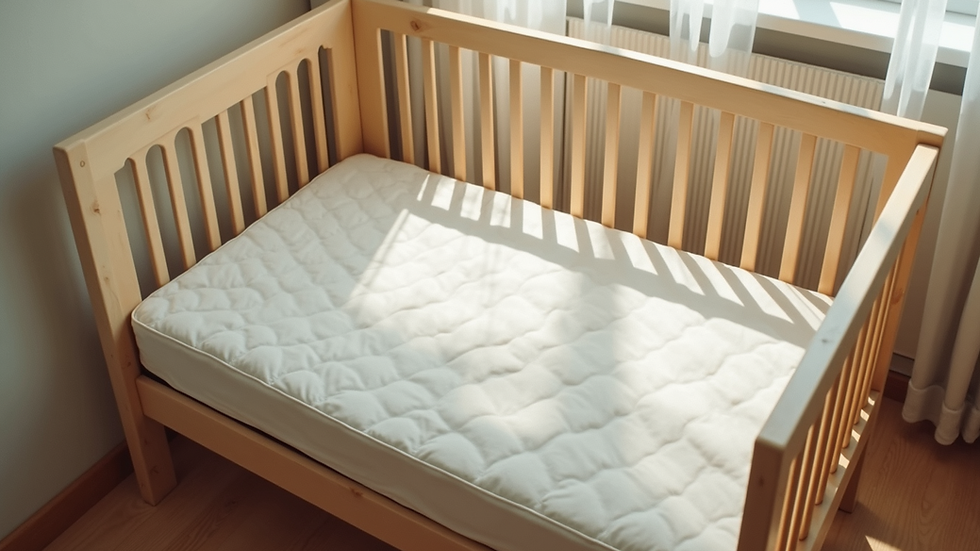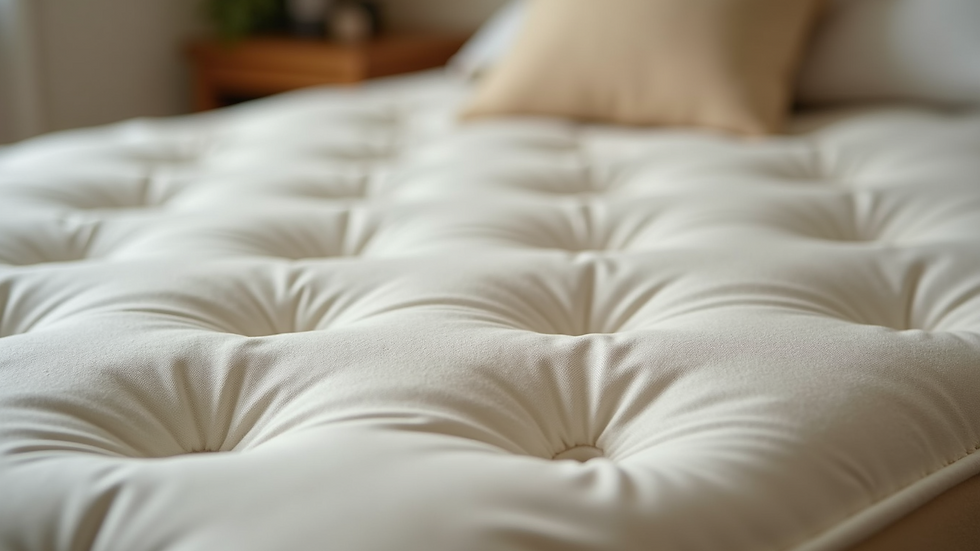Choosing the Best Organic Crib Mattress for Your Baby
- Sleep Diva

- Jul 21, 2025
- 3 min read
Updated: Aug 23, 2025
As new parents, creating a safe and healthy sleeping environment for your baby is a top priority. One of the most important decisions you'll make is choosing the right crib mattress. With the rise in awareness about toxic chemicals, many parents are now opting for organic and chemical-free baby mattresses. But how do you choose the best one? In this guide, we'll explore the essential factors to consider when selecting an organic crib mattress.

Understanding Chemical-Free Baby Mattresses
Chemical-free baby mattresses are designed without harmful chemicals like flame retardants, formaldehyde, and other toxic substances. These harmful chemicals can cause health issues and discomfort for your baby. Instead, manufacturers of organic mattresses use natural materials like cotton, wool, and latex.
Choosing a chemical-free baby mattress provides several benefits. For starters, these mattresses are less likely to trigger allergies, which is crucial for infants whose immune systems are still developing. Additionally, they promote better air quality in the bedroom, which is essential for a baby’s respiratory system.
When searching for the right mattress, look for certifications such as GOTS (Global Organic Textile Standard) or GREENGUARD Gold. These certifications ensure that the product meets stringent environmental and health standards.

What to Look for in an Organic Crib Mattress
When selecting an organic crib mattress, several factors should be taken into account:
1. Material Quality
The quality of materials used in the mattress greatly affects both safety and comfort. Look for mattresses made with:
Organic cotton
Natural latex
Organic wool
Organic cotton is soft and breathable. Natural latex, derived from rubber trees, provides excellent support and durability, while organic wool is a natural flame retardant and can regulate temperature effectively.
2. Firmness
Infants need a firm sleeping surface to reduce the risk of Sudden Infant Death Syndrome (SIDS). Soft mattresses can pose a suffocation hazard. Choose a mattress that is firm, yet comfortable, and check if it meets safety standards for infant sleep.
3. Waterproofing
Babies can be messy. A waterproof cover can protect the mattress from spills and accidents. Look for organic, non-toxic waterproof covers that won’t compromise the mattress's quality or contribute to harmful chemicals.

Is it Worth It to Get an Organic Mattress?
While organic crib mattresses may come with a higher price tag than traditional options, many parents argue that the benefits outweigh the cost. Here are a few reasons why investing in an organic crib mattress is worth it:
Health Benefits: Minimizing exposure to harmful chemicals can lead to better overall health for your baby.
Longevity: Organic mattresses tend to be more durable, meaning you won't need to replace them as often. Look for warranties that reflect the mattress's expected lifespan.
Resale Value: If you choose to sell or donate the mattress in the future, organic options often hold their value better than conventional mattresses.
Sustainability: Choosing organic products supports sustainable farming and reduces environmental harm. It’s a choice that benefits both your baby and the planet.
Important Features to Consider
When looking for the best organic crib mattress, consider the following features that add to its longevity and utility:
1. Breathability
Proper airflow is essential for a baby’s sleep. Select mattresses designed with breathability in mind. Natural latex tends to provide better airflow, keeping your baby comfortable throughout the night.
2. Certifications
Choose a mattress that has reputable certifications. Look for labels such as:
GOTS (Global Organic Textile Standard)
GREENGUARD Gold
CertiPUR-US (for foam mattresses)
These certifications ensure that the product has been thoroughly tested and meets high standards for safety and sustainability.
Caring for Your Organic Crib Mattress
Proper care can help extend the life of your organic crib mattress. Here are some essential care tips:
Regular Cleaning: Spot clean as needed and vacuum regularly to keep dust and allergens at bay. Avoid harsh chemical cleaners.
Use a Mattress Protector: A breathable, organic mattress protector can add an extra layer of protection against spills and accidents.
Rotate the Mattress: Rotating the mattress every few months can help maintain its shape and firmness.

Final Thoughts
Choosing the best organic crib mattress for your baby is crucial for providing a safe and healthy sleep environment. By considering material quality, firmness, and certifications, you can make an informed decision that prioritizes your baby's health.
In addition to the immediate benefits, opting for an organic mattress has long-term advantages for both your baby and the environment. So, invest wisely in their sleep—you’ll be glad you did!




Comments